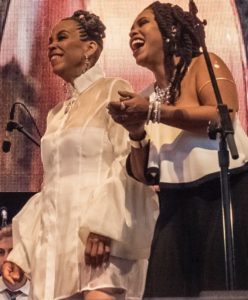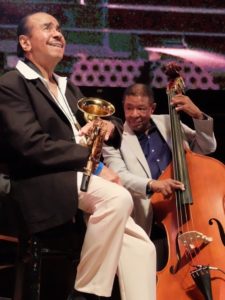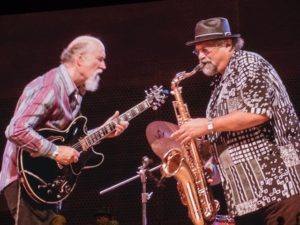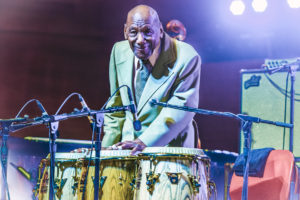My DownBeat overview of the 38th annual Chicago Jazz Festival, comprehensive as I could make it, didn’t go into depth on any of the couple dozen performances I heard from Sept 1 through 4 in downtown
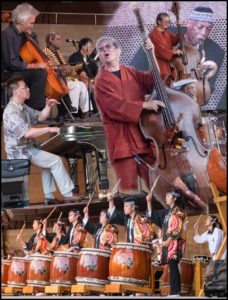
Bassist Tatsu Aoki’s Myumi Project with pianist Jon Jang, cellist Jaime Kempkers, tenor saxophonists Ed Wilkerson and Francis Wong, baritone saxist Mwata Bowden, Tsukasa Taiko with soloist Kioto. Photo montage by Marc PoKempner.
Millennium Park and the Cultural Center. So here, with imagery by my photojournalist colleagues and friends Marc PoKempner and Michael Jackson (whose photo of drummer Dave King of the Bad Plus graced that DownBeat review) are some previously unreported details.
- Tatsu Aoki‘s Miyumi Project continues to evolve as the Tsukasa Taiko Legacy troupe with soloist Kioto leans ever-closer into the rhythms of his jazz-oriented ensemble — driven by traps drummer Avreeayl Ra and hand-percussionist Coco Elysses. On this date Aoki’s Bay Area Asian Improv colleagues Jon Jang (piano) and Francis Wong (tenor sax) — who performed a stunning mouthpiece-only solo — joined Jaime Kempkers, cello; Edward Wilkerson, tenor sax; Mwata Bowden, baritone sax, for no-holds-barred give-and-take.
- Charlie Haden’s Liberation Music Orchestra, with the late founder’s bass chair filled by his one-time student Scott Colley, performed new arrangements by conductor Carla Bley that managed to be simultaneously free for roaring and transparently structured, genuinely patriotic and suffused with sad/defiant critical expression. Trumpeter Michael Rodriguez was probing on most of the brass solos, but his section-mate Seneca Black crowned “American the Beautiful” with a gleaming high note.
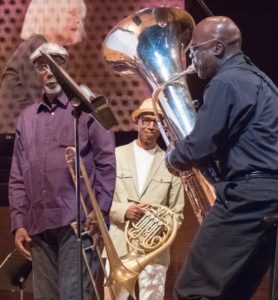
from left: Curtis Fowlkes, Vincent Chancey, Joe Daley in Charlie Haden’s Liberation Music Orchestra, arranged and conducted by Carla Bley. Photo by Marc PoKempner
Tenor saxophonists Tony Malaby and Chris Cheek presented a contrast of solo styles — the former voluble and gruff, the latter selective and bell-toned. Bley was understated when conducting, and deliberate at the piano; her charts applied high and low voices artfully, for clarity. Alto saxist Loren Stillman, guitarist Steve Cardenas, drummer Matt Wilson should not go unmentioned; trombonist Curtis Fowlkes, french horn player Vincent Chancey and tuba player Joe Daley supplied colorful depths.
- Ornette Coleman’s 1971 album Science Fiction is one of my all time favorites, as related in Miles Ornette Cecil – Jazz Beyond Jazz. The Bad Plus with guests Tim Berne (alto sax), Ron Miles (trumpet) and Sam Newsome (soprano sax) did a mitzvah bringing to life Coleman’s seldom-attempted compositions “Law Years,” “Civilization Day,” “Street Woman,” as well as two originally sung by Asha Puthli, “All My Life” and “What Reason Could I Give.” Those two unusual ballads are gorgeous, were capably sung by Bad Plus bassist Reid Anderson (who does not usually sing in performance), and pianist
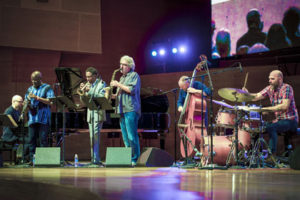
from left: Ethan Iverson, Sam Newsome, Ron Miles, Tim Berne, Reid Miles, Dave King. Photo by Michael Jackson, who despairs of the image’s size.
Ethan Iverson performed an awesome episode on “Reason,” stating the melodic theme slowly with his left hand while with his right, independent of his bass rhythm, he touched on high notes as if lighting stars.
- Cameron Pfiffner and five other Chicago-identified reedists in his occasional group
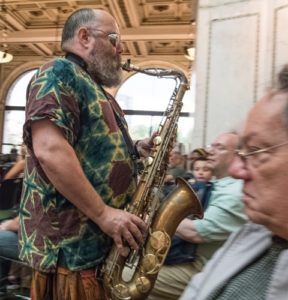
Cameron Pfiffner in Preston Bradley Hall of the Chicago Cultural Center, Howard Mandel listening — photo by Marc PoKempner
Adolph’SÂ AXÂ blew without amplification, walking through the crowd under the Tiffany dome at Chicago’s Cultural Center, to explore the glorious room’s acoustic properties. Although it may look otherwise from my expression, I was intrigued, not displeased.
- Africa and Maggie Brown, daughters of the late singer-songwriter Oscar Brown Jr., sang their father’s lyrics with delightful high spirits and a casual back-and-forth as if they were in a private home or cabaret.
- Tenor saxophonist Benny Golson chose not to play some of his best known compositions — no “Killer Joe,” no “Along Came Betty,” no “I Remember Clifford.”
But accompanied by pianist Mike LeDonne, bassist Buster Williams and drummer Carl Allen, Golson did essay a perfectly lovely version of his song “Whisper Not.” He claimed the title had no specific meaning, that he’d chosen the words at random. Hard to believe, but he wouldn’t lie. And if Duke Ellington’s theme song “Take the ‘A’ Train” is Golson’s usual set-ender, at age 87 he’s got his reasons and they deserve respectful consideration.
-  I’m still trying to figure out how I liked the music of Christian Scott a Tunde Adjuah. He’s a powerhouse on trumpets and bold onstage, which shook things up. His “Stretch music” label is supposed to encompass jazz and other genres, though of course I heard it as jazz beyond “jazz” —
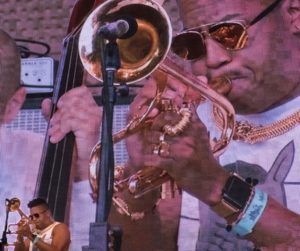
Christian Scott a Tunde Adjuah, in front of the Pritzker Pavillion’s giant video screen. Photo by Marc PoKempner
an attempt to get at the real excitement in the art form’s essence that is too frequently forgotten amid the accretion of history, tradition, convention, rote performance, tired blood, call it what you will. It seems obviously a descendent of Miles’ post-Bitches Brew, but more than just that. Flutist Elena Pinderhughes provided a cool contrast to overtly physical Adjuah; pianist Lawrence Fields played one affecting solo on Rhodes piano. The leader’s street style and bountiful energy makes him seem outsized.
- Guitarist John Scofield and tenor saxophonist Joe Lovano, on their final date of a Stateside tour, kicked out the jams like comfortably rambunctious best old friends. Bill Stewart drummed, Ben Street played bass, Joe and Sco’s tunes served to get them into and out of the blowing, during which all four seemed connected at the hip (by the hip?).
- Candido Camero, conguero, capped the festival with Latin jazz all-stars. Conga drums (Sammy Figueroa filling
in behind Candido) and  clavé are integral to any 21st century fest comprehensive representation of present-day Western Hemisphere music. We got that from a master.

